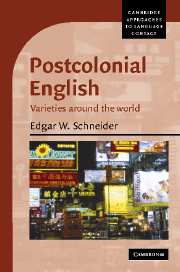Book contents
- Frontmatter
- Contents
- List of maps, figures, and tables
- Series editor's foreword
- Preface and acknowledgments
- List of abbreviations
- 1 Introduction
- 2 Charting the territory: Postcolonial Englishes as a field of linguistic investigation
- 3 The evolution of Postcolonial Englishes: the Dynamic Model
- 4 Linguistic aspects of nativization
- 5 Countries along the cycle: case studies
- 6 The cycle in hindsight: the emergence of American English
- 7 Conclusion
- Notes
- References
- Index of authors
- Index of subjects
1 - Introduction
Published online by Cambridge University Press: 15 December 2009
- Frontmatter
- Contents
- List of maps, figures, and tables
- Series editor's foreword
- Preface and acknowledgments
- List of abbreviations
- 1 Introduction
- 2 Charting the territory: Postcolonial Englishes as a field of linguistic investigation
- 3 The evolution of Postcolonial Englishes: the Dynamic Model
- 4 Linguistic aspects of nativization
- 5 Countries along the cycle: case studies
- 6 The cycle in hindsight: the emergence of American English
- 7 Conclusion
- Notes
- References
- Index of authors
- Index of subjects
Summary
One of the most remarkable, and perhaps unexpected, sociocultural changes of the modern period, culminating in the late twentieth century, has been the global spread of the English language, a major component of a “language revolution” postulated by David Crystal (2004). For centuries scholars have dreamt of a single, universal language which would allow all of mankind to communicate with each other directly, but all attempts at constructing such a code artificially have failed in practice. Now, it seems, one has emerged quite naturally. The English language has spread into precisely this role without any strategic planning behind this process – it is the world's lingua franca and the language of international communication, politics, commerce, travel, the media, and so on. However, at the same time, and contrary to expectations, English has diversified, developing into homegrown forms and uses in many locations. It has also become an indigenized language, even a mother tongue, in several countries around the globe. In some countries, the descendants of former colonists or colonizers have retained the language to the present day; in others, interestingly enough, it was the local, indigenous population who have adopted and appropriated the English language for themselves, thus contributing to its diversification and the emergence of new varieties.
Certainly this state of affairs is the product of colonial and postcolonial history, most notably the spread of the British Empire.
- Type
- Chapter
- Information
- Postcolonial EnglishVarieties around the World, pp. 1 - 7Publisher: Cambridge University PressPrint publication year: 2007

